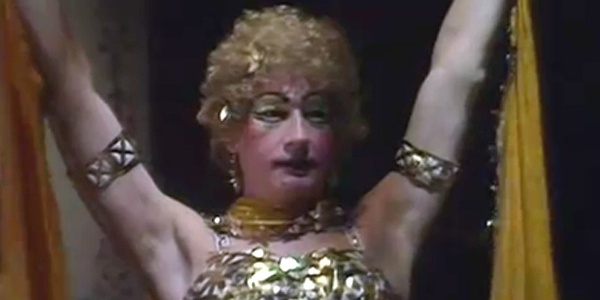This post is part of the “Love Hurt” Blogathon, hosted by Janet at Sister Celluloid. Read the other posts about the amazing John Hurt here!
Robert Graves’ remarkable historical novels about the first Emperors of Rome were adapted for television in 1976 by the BBC. To this day I, Claudius is considered one of the best mini-series of all time. Though the production seems antiquated now, it hardly matters. Featuring many great performances, including Derek Jacobi as Claudius, Sian Phillips as his murderous grandmother Livia, Brian Blessed as Emperor Augustus, George Baker as Emperor Tiberius, Margaret Tyzack as Antonia, and Patrick Stewart as Sejanus, among others, it would take a lot to stand out in this crowd of amazing thespians.
John Hurt, as Caligula, does just that.
Of course, it helps when it’s a very showy role. Caligula is most famous for capricious and outrageous–as well as cruel and murderous–behavior. Historians have long debated the cause of his bizarre acts. He had a horrendous childhood where his father, mother, and two of his brothers were murdered, most likely at the order of his Uncle Tiberius. Many attribute it to an illness (some speculate he was actually poisoned).
His succession at the age of 25 was hailed all over the Roman Empire. Partly because he was the son of the popular Germanicus, partly because he was initially a generous and benevolent ruler, and partly because everyone thought there couldn’t possibly be anyone worse than Tiberius. What many didn’t realize is if he had been the paragon they thought he was, he never would have survived Tiberius’ reign.
This adaptation of Graves’ books takes what is often presented as dry history and turns it into a churning family melodrama that carefully skirts on the edge of comedy. 80s nighttime soaps such as Dynasty and Dallas had nothing on I, Claudius. Betrayal, incest, despotism, murder–this show has it all. (It was a great preparation for watching Game of Thrones. The first time I viewed it, my parents, who had seen it already, warned me not to get too attached to any of the characters.)
By the time Hurt as the young adult Caligula shows up, the character has already conspired to murder his father and committed incest with all three of his sisters. His mother and brothers have been arrested but he doesn’t care one bit about them. He is careful to toady up to his Uncle Tiberius, buying him pornographic books and giving him advice on how to bring down his traitorous henchman, Sejanus.
“You depress me unutterably sometimes!” declares his Uncle Claudius.
Before Caligula ascends the throne, he is more of a sociopathic character, killing his father because he “stood in his way” and helping to plan a purge of Sejanus’ allies as a survival tactic as he plays up to Tiberius.
After he suffers his illness, it’s a whole different class of criminality. Caligula becomes a monstrous villain who wields absolute power. To him, power is almost like a game, where he gets to play “Gotcha!” with subjects who kowtow to him out of fear.
Hurt originally declined the role. He only agreed after being invited to a pre-production party and was impressed by the array of talent involved. Hurt has mentioned in interviews that he had to dig very deep inside himself to find this character.
There are so many ways this performance could have gone off the rails. Not only are many of Caligula’s actions over-the-top, they border on preposterous, for instance, making his favorite horse a senator, which apparently is historically accurate. And make sure you don’t cough too often in his presence. Let’s just say–it wouldn’t end well for you.
Of course, the superb writing, by Jack Pulman, helped a lot. I love how he introduces the horse. It’s announced as a guest at a wedding. Hurt has Caligula talk to the horse with a totally straight face. “You know everybody, don’t you?”
Arguably the most famous scene in the series is when Caligula orders his Uncle Claudius and his brothers-in-law to the palace in the middle of the night. Waiting in the darkness, certain they are about to be executed, they are instead confronted with a Caligula in full drag, performing a dance as the goddess of dawn.
I think the dance sequence is famous not just because it’s surprising and funny as hell, but because he plays Caligula as someone desperate for applause and approval. There are times he plays Caligula like a spoiled child who can’t stand to have every whim instantly gratified. Other times, he’s a troubled man who–very briefly–seems to recognize he is mad.
It’s not often you’re sorry to see a cruel despot assassinated, but that’s the case here. There are more crazy members of the Imperial family to discover after he dies (and the show is still terrific), but they don’t have that certain something Hurt gave to this version of Caligula. I’m so glad he changed his mind about playing the part.




excellent essay/well done/ just watching the series again at the moment and what strikes me about the cast is that they were all veterans of the British stage. The quality of acting is unsurpassable, as is the writing and the direction. Different times. You could never assemble a cast like that today.
Thanks so much, I’m glad you enjoyed it! I agree–it’s definitely one of the great TV series casts of all time.
Reblogged this on MOON IN GEMINI and commented:
Busy this weekend, so I’m reblogging a post where I pay tribute to John Hurt’s performance as Caligula in I, Claudius. RIP, John.